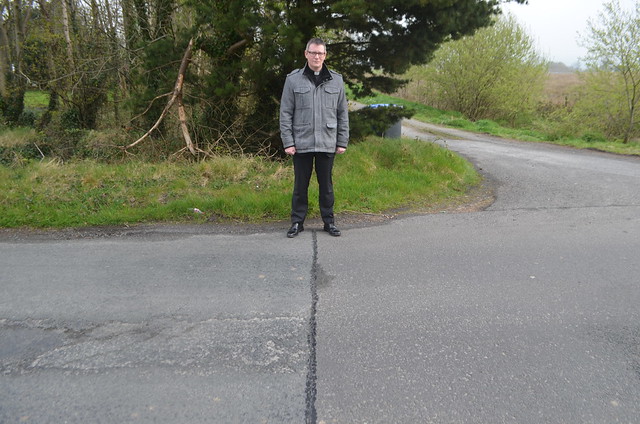Pre-synod
Ministering across the border
Robert Miller, the Archdeacon of Derry and Rector of Christ Church, Culmore, Muff and St Peter’s, discusses parish life in his group of parishes which crosses the Derry–Donegal border.
How do the parishes fit in with the border?
Culmore and Muff have been a union with one select vestry for a long time, and those two entities actually straddle the border. Culmore and Muff were then united with St Peter’s – a relatively new parish which celebrated its fiftieth anniversary recently and began its life as a church plant from Christ Church. There was an established congregation already meeting and growing, which gathered in a local British Legion hall and eventually outgrew that.
That growth led to the plans to build St Peter’s but it opened really just as the Troubles were beginning. All of a sudden, for understandable reasons, a lot of people were moving out of the area. One of the things that contributed to St Peter’s survival was the opening of the Foyle Bridge because it is virtually on our doorstep. Many people who had moved away were still able to keep a connection with it.
Muff church building is in Donegal, in the Republic of Ireland, and Culmore, which is its nearest partner, is on the United Kingdom side. At one point during the Troubles, it would have been very difficult because obviously we had a militarised border at that time, and there were a number of attacks on the checkpoint near the crossing.
Yes, Brexit will bring new challenges. It might even bring old challenges back but they’re challenges that the parishes have faced before and, I think, have a certain resilience to. Obviously, if there wasn’t a hard expression of the border, that would be preferable by far.

In what ways does the border have a practical bearing on parish life?
As the Church of Ireland pre–dates partition, the benefit of that is that we operate as an all–island body in two distinct political jurisdictions. The challenges for me, at the minute, are more in terms of what will the charity regulations require? I have a cross–border parish but all of the mechanism and machinery for that is based in the United Kingdom; the only reason we collect money in euro and maintain a euro account is because our bills for Muff are all in euro. Technically, we’re a group of four parishes with three select vestries and they work well together.
How has the prospect of Brexit changed living near the border?
The challenge, there, is more pastoral, in terms of the uncertainty that it has created for people for whom really – in day–to–day living – the border is invisible. They live in one political jurisdiction and work in another. They have family on both sides. As a group of parishes, we reach across it.
Some people have very trenchant views on what should or what shouldn’t take place. As a church, we have to minister to both and say as Christians: “How do we live and minister and relate to one another with that disagreement?” The challenge for the Church is to speak into that context without saying, the position of the Church is for Brexit or it’s against Brexit, it’s for a hard border or against it.
The other issue that is in people’s minds is the Chief Constable’s concern about the possibility of attacks on border infrastructure and, in that context, I would have an obvious concern for the safety of my parishioners. When a terrorist attack happens, it doesn’t just affect the person but the wider community as well and the recent bomb attack in Derry outside the courthouse would be an area of concern.
In part, we need to commit more of our resources to working towards establishing peace, building relationships and encouraging reconciliation. Derry has a very particular place within the conflict in Ireland and so there’s perhaps a very particular role that we have as well.
And how have you found working near the border?
I enjoy it. I’m a Derryman. I grew up in this city. I went away to university in ‘89 and didn’t really expect to be coming back, but I enjoy living here. At a formative time for my family, living in the city has been great. The opportunities have blossomed in the area, particularly with regard to the arts and music. Plus, you’re never too far away from a beach.
There’s a slightly different attitude in Donegal to Derry and that creates a very creative dynamic of how we look at things. I do think there’s a benefit of having a slightly different approach – some of that is ‘country–town’ difference but also part of it would benefit from there being two political realities. They can creatively inform each other.
If you look across the diocese, we cover quite a wide geographical area, so again you’re bringing that hinterland in. I sometimes joke with some of my extended family and friends who are County Antrim–based that they look at a map and get to the Glenshane Pass, and then it’s just blank and says: ‘There be monsters … terra incognita’. And there is a bit of that sense. But when people come to Derry, they love it and obviously we’re hoping that will be the experience of General Synod.
You can find out more about the grouped parishes’ ministry on their website.
#coigs
